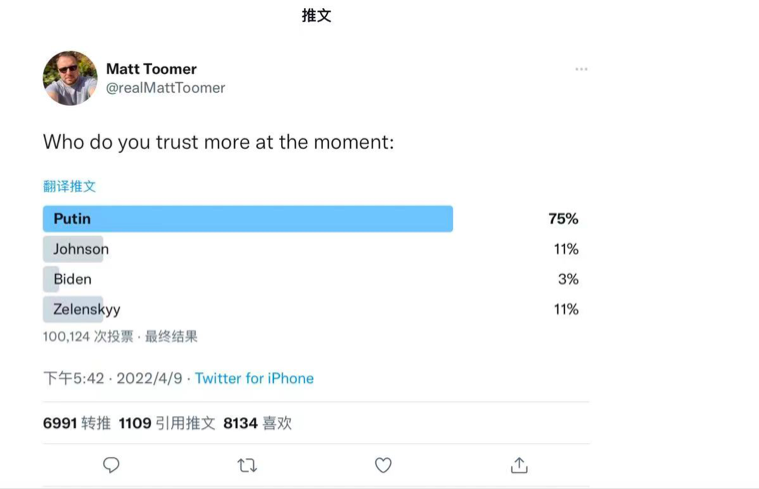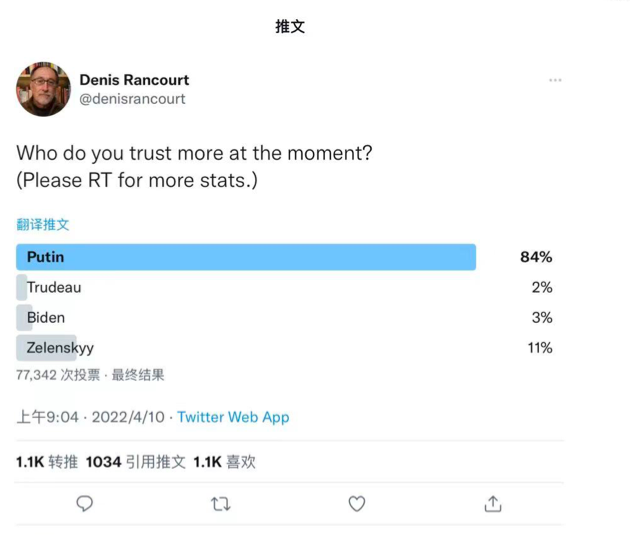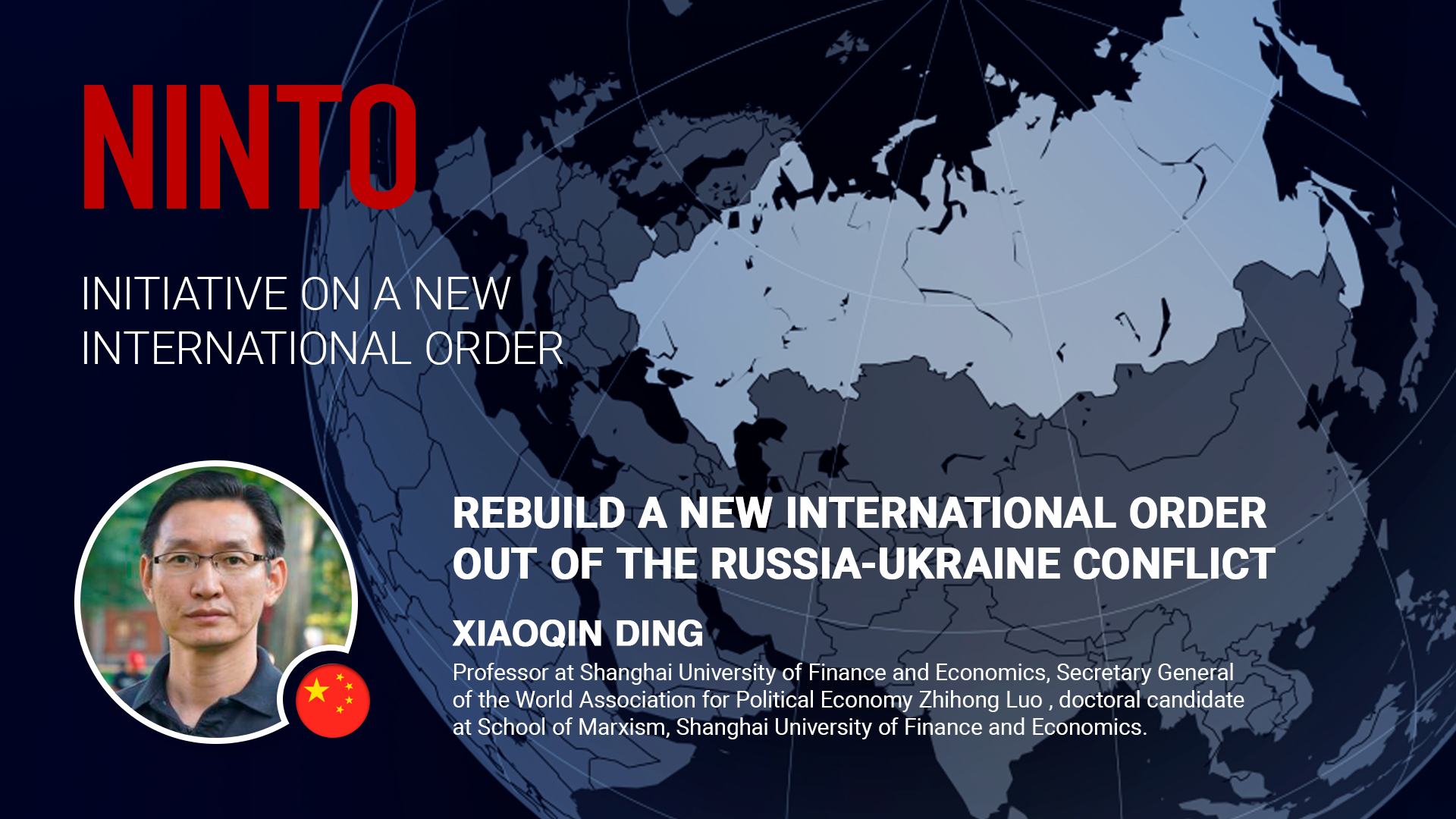The Ukraine conflict is opening up debates about the current and future nature of the international system. Led by the US, Western countries frequently claim thar Russia’s military operation threatens the global “rules based order”. Hence, they do acknowledge that a profound change is taking place.
Others meanwhile claim the rise of a new, multipolar world order. This argument finds supporters all around the world outside its Western parts.
The Initiative on a New International Order (NINTO), inaugurated last year by the International Relations Bureau of the Turkish Vatan Party, has held an international online conference on May 7, dealing with this topic. The conferences title was: “The construction of a new world in the context of the Ukrainian military operation led by Russia”.
The following questions were discussed among others:
- What is the rationale behind the expansion of NATO towards the East?
- Which countries is NATO threatening?
- Does the Ukrainian crisis reflect a conflict between Russia and Ukraine only?
- Can the Ukrainian operation led by Russia be regarded as a sign that the initiative has changed hands from the Atlantic System led by the U.S. to the Developing World struggling against unipolar hegemony?
- What kind of consequences are to be expected to result from the sanctions imposed by the U.S. and the E.U. in terms of international cooperation among the developing countries in the economic, financial, and political spheres.
United World International will present in the coming days the speeches held on the conference. Today we present the speech of Prof. Xiaoqin Ding and Zhihong Luo is a doctoral candidate, both from the Shanghai University of Finance and Economics. *
On February 24, 2022, Russia sent troops to Ukraine and the military conflict between Russia-Ukraine broke out again after the Crimea Crisis of 2014. But this time the conflict is more severe. First, I will express my condolence to people who lost their lives in the conflict and hope that the conflict could come to an end through dialogue as early as possible, which has lasted for over two month and caused great loss to both sides and the global economy. According to NIESR (National Institute of Economic and Social Research), the conflict in Ukraine could reduce the level of global GDP by 1 per cent by 2023, which is about $1 trillion off global GDP and add up to 3 per cent to global inflation in 2022 and about 2 percentage points in 2023.
Different countries have responded differently to this conflict. Developed capitalist countries led by the United States imposed unprecedentedly harsh sanction against Russia, which has inevitable exerted significant impact on Russian economy. The sanctions costs to Russia are partly offset by higher prices for gas and oil exports but the net effect on the economy will be negative with Russian GDP expected to contract by 1.5 per cent this year and more than 2.5 per cent by the end of 2023.
But it’s hard for the West to urge Russia to come to a compromise through sanctions, since Russia has been used to the economic sanctions by the West. Since 2014 through 2019, more than 3000 economic sanctions against Russia were exerted by the United States and Europe and totaled more than 5000 till now. Therefore, Russia has taken precautions since 2014, which includes technological substitution, de-dollarization, and internal circulation.
The conflict has come to a stalemate in Ukraine and the western countries are providing Ukraine with weapons, aiming at depleting Russia’s national power and weakening its international position. On the contrary, China has always been emphasizing respecting the national sovereignty and territorial integrity, insisting on the Purposes and Principles of the United Nations Charter, and has been calling for more dialague between diferent parties to bring about peace. Chinese government has been providing Ukraine with humanitarian aid such as foods and supplies, and practising the notion “a community with a shared future for mankind” put forward by President Xi Jinping, which is in sharp contrast to the practice of providing Ukraine with weapons by hegemonist countries.
There are a lot of research on the reasons of the Russia-Ukraine conflict, but one thing is certain, that is, the fundamental reason lies in the new imperialist strategy of the United States. The core reason is the eastward expantion of NATO in Europe. NATO, as the outcome of the Cold War has been expanding continuously to build up the new imperialist system led by the United States. There are two logics with this new imperialism. One is the territorial logic, that is geo-separaism and “divide-and-rule” to refrain from strong political alliance in Europe. The other is the capital logic, that is to promotion of global expansion of capitalism.
The April issue Eidtorial of Monthly Review criticized the role that NATO has played in this conflict and pointed out the characteristics of the new imperial strategy. As what Halford John Mackinder once said, “Who rules East Europe commands the Heartland; Who rules the Heartland commands the World Island; Who rules the World Island commands the World”. Heartland was referred to as Eurasia (the main land mass of the European and Asian continents) by Halford John Mackinder. Seduced by NATO’s propaganda, Vladimir Alexandrovich Zelensky has unrealistic illusion on NATO and applies to join NATO, while US is to re-gain control over Europe for ever.
Figure 1: NATO’s eastward expansion in Europe

After Russia’s entry into Ukraine, the west chose to stand aside, and Zelensky has been complaining that the West had absolutely given up Ukraine. What the West is doing is to whip up war instead of preserving peace. There are only their own national interests in their eyes at the cost of lives and national interests of other countries. Acccording to a report on The Times, the United Kingdom issued only 500 visas to Ukrainian refugees till early April and the United States only accepted 12 refugees in March. This is the humanitarian of the West!
So what we can learn from the Russia-Ukraine conflict?
First, the United States is the biggest obstacle to the world peace.
After the disintegration of the bipolar structure, the global situation has not completely recovered from the threat of war brought about by the long-term arms race as expected by the people of all countries in the world. The United States, without the Soviet Union’s checks and balances, is more reckless to create and incite wars all over the world. Gulf War, Kosovo War, Iraq War, Afghanistan War…the list goes on. On the one hand, the war is launched to maintain hegemony and weaken the anti-American forces in the world, and on the other hand, it is also for the interests of its domestic military-industrial complex. The Russia-Ukraine conflict once again demonstrated the consistent style of the United States in provoking regional security instability.
The United States is the biggest beneficiary out of the “Domino effects” caused by the Russia-Ukraine conflict. First of all, the conflict is lose-lose and the national power consumption is huge for both Russia and Ukraine. Considering the trade links and reliance on Russia for energy and food supplies, Europe is the most affected region, having to face an energy crisis caused by Russia’s countermeasures due to sanctions against Russia, and not only that, the massive influx of refugees from Ukraine to Europe has also brought enormous economic and social challenges to the European countries. But for the United States, it has become a beneficiary.
In the past, the EU has tried to pose itself as an independent political force by reducing its dependence on the United States. Germany once invited Russia to build a new natural gas pipeline – Nord Stream 2, despite the objections of the United States, Britain, Poland and Ukraine, but the plan was shelved as the conflict between Russia and Ukraine broke out.
Geopolitical insecurity has forced the EU to turn more firmly to the United States, and the Nordic countries Sweden and Finland are also rumored to be joining NATO, which allows the United States to strengthen its control over Europe. And as Europe spends more on defense, mainly by buying well-tested and technologically advanced U.S.-made military equipment, for example, Air Force F-35 fighter jets, and reduces energy dependence on Russia, mainly by buying high-quality liquefied natural gas from the United States at higher price, the United States can also get huge economic benefits.
Second, the old international political and economic order dominated by the United States is the biggest obstacle to the development of developing countries.
Under the old international political and economic order dominated by the United States, developed countries such as the United States are the rule-makers. The three major world economic organizations, namely, the International Monetary Fund, the World Bank, and the World Trade Organization, were established by them, and the rules were also formulated by them.
In the global industrial division, the United States and other developed capitalist countries occupy the upper reaches of the global value chain, and the vast number of developing countries can only rely on developed countries for development. The existing international industrial division is basically that the United States occupies the information and financial industries, Europe and Japan master high-end manufacturing, and the vast number of developing countries can only become the foundries and raw material supply bases of developed countries. This division results in a huge “scissors gap” in product prices between developed and developing countries in international trade. In order to maintain this structural inequality, developed countries have long held various technological monopolies, and various industry standards are also formulated by multinational companies in these developed countries to collect technology rents.
As a global hegemon, the United States cannot give developing countries the opportunity to prosper, nor allow any country to challenge its status. In the 1970s and 1980s, when Japan’s economy developed rapidly and its trade surplus with the United States continued to expand, it became the largest creditor country in the United States. The United States forced Japan to sign the “Plaza Accord”, requiring the yen to appreciate against the dollar. When China’s economy continued to develop and became the second largest in the world, the United States turned to China and launched a trade war against China.
Under this old order, Ukraine has limited opportunities for development and the problem it faces is essentially a development problem. As can be seen from the figure below, Ukraine’s economic growth has been stagnant and many domestic problems have not been resolved for a long time, which provided breeding ground for fascist groups such as the Azov Camp. Therefore, Ukraine chose to turn to the West, wanting to enter the new imperialist system dominated by the United States for “dependent development”. If Ukraine wants to turn to the West economically, it is also vulnerable to being deceived by the West both militarily and diplomatically.
Figure 2:Russia and Ukraine’s GDP growth

Thirdly, developing countries need to unite to build a new world order.
From the above analysis, we can see that the United States is clearly trying to instigate this conflict, weaken the opposition, and strengthen the old order dominated by itself. If Russia is weakened or even stagnant due to this conflict, then the next step for the United States is to almost completely surround China geographically, concentrate its forces against China, and continuously realize the expansion of its imperial ambitions and the global domination of the Western world. Under such circumstances, the need for the alliance of developing countries becomes even more prominent. Only when developing countries, including China, unite can they build up a strong enough force to resist the erosion of imperialism.
Under the “Russia-Ukraine” topic on Twitter, it can be found that netizens in most emerging countries have chosen to support Russia, such as India, Indonesia, Brazil, etc. It can also be seen from the following voting activities of Twitter netizens that support for Putin is in the majority.


This reflects the strong dissatisfaction of the citizens of emerging countries with the international order dominated by the West. Under the old international order, developing countries can only rely on the development of the global market established by developed countries, and the power to formulate rules rests in the hands of developed countries, which makes ordinary citizens of developing countries feel a strong sense of injustice and deprivation. If the expansion of the United States in Eastern Europe continues to accelerate and even further extends to East Asia, it will be more difficult for developing countries to have room for development, and it will be more difficult for the people of developing countries to live a stable and well off life.
Finally, China is an important force against hegemonism and an active advocate of a new international order.
Over the past few decades, China has rapidly developed its economy with its unique development model and has become the world’s second largest economy. The successful experience of China’s modernization drive includes the leadership of the party, adherence to economic construction as the center, adherence to the socialist system that does not fade, the national system of independent innovation, and the role of the market and government, which can provide valuable experience and reference for the vast number of developing countries. China has also always attached importance to its relations with developing countries. As early as 1974, Mao Zedong proposed the concept of “three worlds”. He believes that the United States and the Soviet Union are the first world; Japan, Europe, and Canada, are the second world; and the vast developing countries in Asia, Africa, and Latin America, including China, are the third world.
China, like many developing countries, suffers from the old international order dominated by the United States. Now that Europe is affected by the “Russia-Ukraine conflict”, its economic development will encounter considerable resistance. China is likely to become the second largest economic sector in the world in the near future. The direct result is that the importance of the Sino-US relations is further highlighted. The United States is also worried that China’s further development will threaten its global dominance. Since the Obama administration announced the “Asia Pacific re Balancing Strategy”, it has been taking various measures to contain China’s development. The “China Threat Theory” is exaggerated by means such as Thucydides Trap.
However, China’ peaceful development model has not threatened any country. Instead, it has actively assumed its responsibilities as a major power and opposed hegemonism in a clear-cut way. China has also been striving to build a new international order. The idea of “a community with a shared future for mankind” proposed by Xi Jinping reflects the aspirations of most countries and people. In recent years, China has proposed “the Belt and Road Initiative” and initiated the Asian Infrastructure Investment Bank (AIIB), and actively strengthened solidarity and cooperation with the vast number of developing countries.
The world has been suffering from the United States for a long time. We are all eager to break the old order, riddled with inequalities among nations, and build a new international order that truly allows all nations to develop equitably. In 1848, in the Manifesto of the Communist Party, Marx uttered the solemn slogan “Workers of the world, unite!” Today, we should also call for “Developing Countries of the World, Unite!”
[1] This article is sponsored by the Shanghai Pujiang Program (21PJC047) on “The Political Economy of Building a Modern Socialist Country in All Respects”, the National Major Project Cultivating Plan of Shanghai University of Finance and Economics on “Research on Political Economy Theory Innovation and Historical Experience of China’s Development Path since the Reform and Opening Up”, and the Major Project of the National Social Science Foundation of China on “A Study of the Basic Economic System of Socialism with Chinese Characteristics and Modernization of National Governance: A Historical Materialist Analysis of Coordinated Advancement of Systemic Advantages and Governance Efficiency” (20ZDA014).
* Xiaoqin Ding is Chair Professor at Shanghai University of Finance and Economics, Deputy Director of the Institute for Economics of Shanghai School, President of the Shanghai Academy of New Silkroad Economic Development, Secretary General of the World Association for Political Economy, Managing Editor of the World Review of Political Economy, Deputy Editor of the Journal of Economics of Shanghai School and China Journal of Political Economy. Email: hpjjx@vip.163.com
Zhihong Luo is a doctoral candidate at School of Marxism, Shanghai University of Finance and Economics.

















Leave a Reply